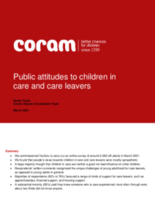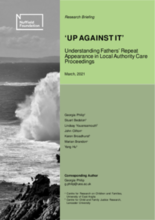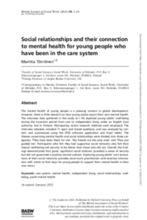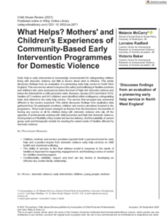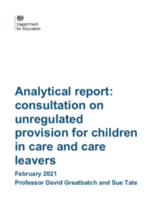Displaying 251 - 260 of 1185
This essay describes the impact of the pandemic on the authors' experiences as Independent Visitors (IVs) for children who are looked-after.
This article explores population-level prevalence of Posttraumatic stress disorder for Young Children (PTSD-YC) to test whether application of Alternative Algorithm for PTSD (AA-PTSD) criteria, relative to the DSM-IV PTSD algorithm, increases identification of 5-6 year old children with clinical needs, in both the general population, and among looked-after-children where the risk of mental health issues is greater.
Coram, the UK’s first children’s charity, commissioned YouGov to carry out an online poll of 2,092 UK adults, who were asked questions regarding children in care and care leavers. YouGov provided a breakdown of responses by groups of respondents and Coram's own qualitative and quantitative analysis of the answers follows.
This mixed methods research project, involving twenty participating local authorities and eight voluntary organisations from a wide geographic spread across England, was carried out between 2017 and 2019. The study was designed to investigate fathers and their recurring appearance in care proceedings at a macro, meso and micro level, with each element collecting and analysing data for distinct but related research questions.
The interview data gathered in this study explored young adults’ well-being during the transition period from care to independent living under an English local authority and in Finland.
This event will feature a discussion of how data-informed initiatives are having a direct impact on improving services and outcomes for children and young people in need of care and protection in Scotland.
"Unregulated homes for children in care under the age of 16 will become illegal in England from September," according to this article from BBC News.
In this article, Sky News follows the court case of a 16-year-old in the UK with no parents, carers or home, who has repeatedly threatened to kill herself.
This article discusses findings from an evaluation of a pioneering early help service in North West England. This new service aimed to improve the safety and wellbeing of families (mothers and children) who were assessed as below the level of ‘high risk’ domestic violence and below the threshold for a child protection order.
The Department launched a consultation on the use of independent and semi-independent children's care settings that are not required to register with Ofsted (unregulated provision) as a matter of urgency, ahead of the Government’s anticipated wider care review. This report presents the key findings from an independent analysis of responses to the consultation.

